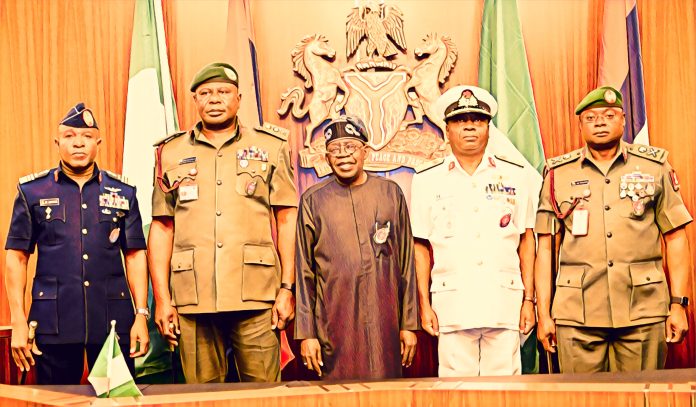Key Points
-
Senate confirmed all new service chiefs appointed by President Tinubu.
-
Defence Chief Oluyede urged police reform and stronger funding for security agencies.
-
Naval Chief Abbas rejected creating a separate coast guard.
Nigeria’s new service chiefs were confirmed by the Senate on Tuesday after their nomination by President Bola Tinubu.
During their screening, they presented new strategies to tackle the country’s security problems.
Chief of Defence Staff Lt. Gen. Olufemi Oluyede asked the government to strengthen the Nigeria Police Force with better funding and training.
He said empowering the police would let the military focus on its core duty of defending the country from external threats.
Oluyede urged steady financial support for the armed forces, noting that the war against terrorism depends on consistent funding.
He also called for local production of military equipment to reduce import dependence.
Oluyede pushes for police reform and public support
Speaking before senators, Oluyede said insecurity had reduced during his time as Chief of Army Staff but added that limited resources still affect operations.
He argued that internal security should be handled by the police, not the military.
“Restructuring and strengthening the police will allow the Army to focus on external defence,” he said.
Oluyede also encouraged Nigerians to see security as a shared duty. “Everyone has a role to play,” he said.
“The fight against insecurity needs cooperation between citizens and security agencies.”
He urged greater investment in intelligence and early warning systems to prevent attacks before they happen.
Naval chief opposes coast guard proposal
Rear Admiral Idi Abbas, the new Chief of Naval Staff, opposed the creation of a separate coast guard.
He said it would duplicate the Navy’s work and waste resources.
“The Navy already handles those duties,” Abbas said. “Funds should be used to improve existing operations.”
He revealed that the Navy is expanding its drone program to monitor oil theft and piracy in remote waters.
“Small acts of theft may look minor, but they add up to serious losses,” he said.
Abbas also outlined plans to improve inland waterway patrols through the Navy’s Special Operations Command in Makurdi.
On rehabilitating repentant insurgents, he said affected communities must be involved.
“Families who lost loved ones need to be part of that process,” he said.
Army and Air Force chiefs promise stronger operations
Major General Waidi Shaibu, the new Chief of Army Staff, vowed to crush the Lakurawa sect, a group behind recent attacks in the north.
He recalled his work in Borno State during the Boko Haram campaign and said those lessons will guide his new role.
“We’ll keep insurgents running,” he said. “They won’t have time to plan new attacks.”
Air Marshal Sunday Kelvin Aneke, the new Chief of Air Staff, promised a “disciplined and effective” Air Force built on training, technology, and innovation.
“Real power isn’t about brute force,” he said. “It’s about skill and adaptability.”



